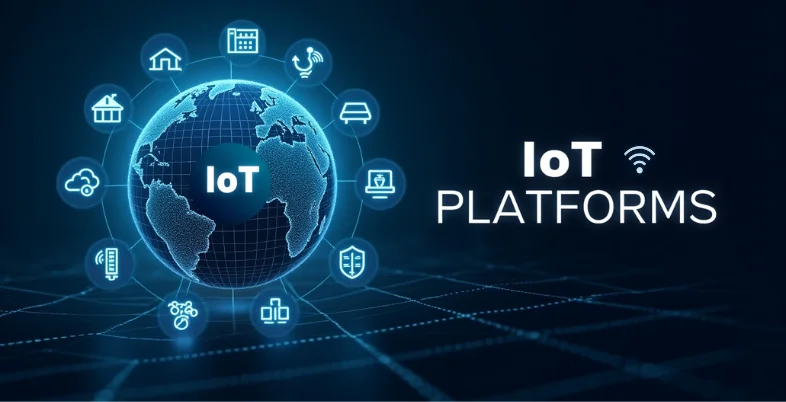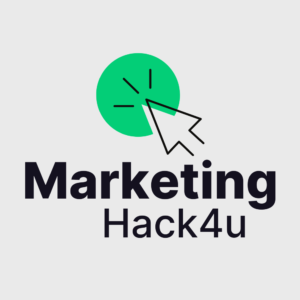The Internet of Things (IoT) has revolutionized how we interact with technology, powering everything from smart homes and industrial automation to healthcare systems and connected vehicles. At the heart of this transformation lies the IoT System: the bridge that connects devices, processes data, and enables real-time action.
With countless options available today, choosing the best IoT Model can feel overwhelming. Factors like scalability, security, device management, cloud integration, and analytics tools all play a vital role.
Whether you’re a startup launching your first connected product or an enterprise scaling a global network, selecting the right platform is a game-changer. This blog explores the top IoT platforms on the market and what makes them stand out in a rapidly evolving digital world.
What Is an IoT Platform?
The Internet of Things Platform (IoT) is designed to assist in the integration of physical devices, such as sensors, appliances, or machines, to the internet and thereby enable them to cooperate and exchange information. It forms a connection between the physical world and digital gadgets, where the information accessed via the related devices can be more simply gathered, preserved, and availed.
An Internet of Things Platform allows you to create innovative solutions that incorporate both software (e.g., applications) and hardware (e.g., devices). It will enable you to manipulate all the information brought in by your devices, process it, and turn it into successful knowledge.
In case you need to monitor the machines in a factory or remotely manage a smart home, an Internet of Things Platform provides you with the means to control, monitor, and adjust how things work in real-time.
What Makes IoT Cloud Services So Essential?
Most connected technologies have an invisible engine, which is IoT cloud services. These services keep devices connected but also able to communicate, process information, and respond intelligently. Let’s explore why IoT cloud services are so crucial.
1. No-Hassle Device Connection
Hundreds or thousands of devices are common to IoT ecosystems. They can all communicate relatively easily because of cloud platforms, which do not consider their location. It guarantees real-time data transfer, automatic refreshing, and easier work with no physical restrictions.
2. Scalable Infrastructure
IoT networks in businesses increase when the businesses expand. Offering scalable infrastructure, cloud services enable add-ons of new devices or services without rebuilding the of a new system as a whole. The cloud scales up or down to meet the 100 sensors or 100,000 sensors.
3. Central Data Management
Data centralization can be considered one of the most significant benefits of IoT cloud services. Apps gather terabytes of information on a daily basis–cloud systems assist in the systematization, storage, and search of this information. This allows simple tracking, fault fixing, and performance tracking anywhere.
4. Real-Time Analytics and Insights
Analytics Cloud technology enables companies to transform data into insights. Be it the consumption of energy in a building or repair requirements in a machine, analysis of real-time data results in faster decision-making, cost savings, and improved service.
5. Increased Security and Compliance
IoT cloud platforms usually have built-in security systems such as data encryption, user access, and threat detection. They assist in keeping sensitive data, but they also adhere to local regulations (such as GDPR or HIPAA), and this is crucial in such industries as healthcare and finance.
6. Faster Time-to-Market
It takes less time to build and implement IoT solutions using cloud services. Pre-configured infrastructures, APIs, and in-built tools make it easy to launch new features or products, allowing businesses to gain a competitive advantage.
There are 10 Best Internet of Things Platforms (IoT)
1. ThingWorx IIoT Platform

ThingWorx is a powerful industrial IoT (IIoT) platform. It assists companies in integrating devices, gathering real-time information, and making intelligent solutions. It also accelerates development and offers users the ability to create applications, control devices, and optimize activities with ready-to-use tools. It is analytics, remote monitoring, and machine-learning friendly.
ThingWorx is commonly applied in manufacturing, energy, and industrial automation. It is reputed to be quick and easy to deploy, flexible, and easy to integrate with other systems, so it is ideal to use in a company developing sophisticated industrial IoT systems.
Features:
- Purpose-built for industrial IoT applications
- Drag-and-drop application builder
- Real-time monitoring and alerts
- Supports predictive analytics and machine learning
- Easy integration with existing systems
- Scalable and secure infrastructure
2. Google Cloud IoT
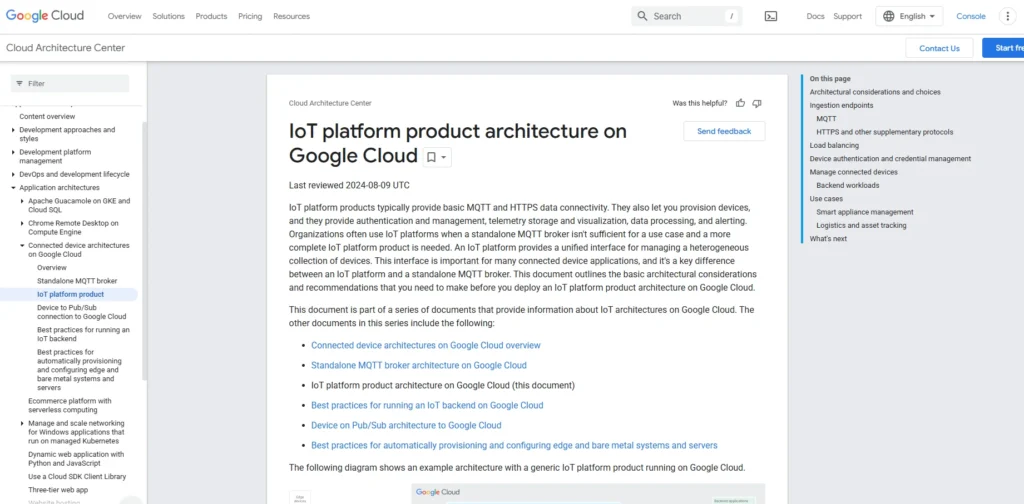
The Google Cloud IoT links and regulates millions of devices worldwide. It collaborates with other cloud services by Google to gather, store, and analyze data. The platform provides real-time monitoring management, good security, and machine learning. It helps in having edge computing, where processing data is delayed less.
Smart cities, logistics, and agriculture make a suitable application of Google Cloud IoT. Using basic instrumentation and auto-scaling capabilities, companies are able to rapidly expand their connected infrastructure in the process of taking useful insights out of their data.
Features:
- Secure device connection and management
- Integration with BigQuery and Cloud AI tools
- Real-time analytics and visualization
- Edge computing with Cloud IoT Edge
- Automatic scaling for large deployments
- End-to-end data encryption
3. Particle
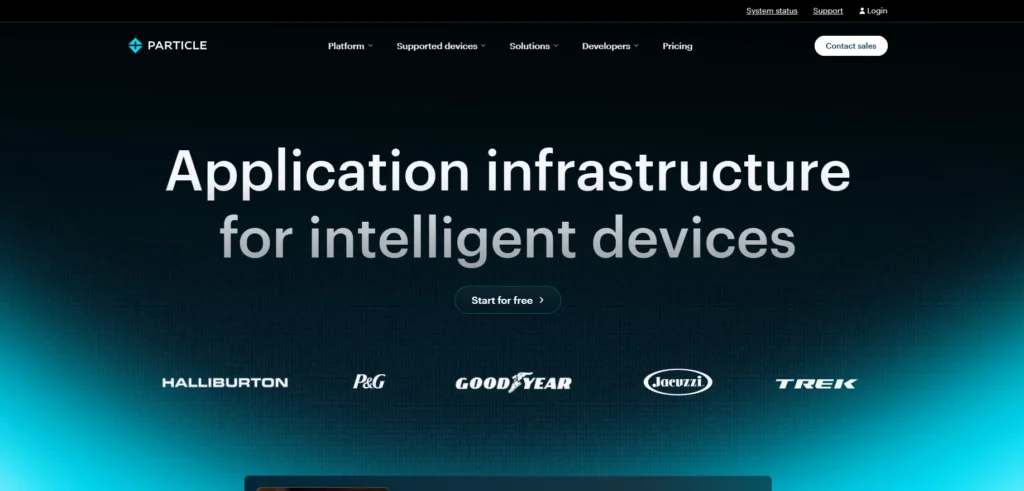
Particle is a famous IoT platforms to create connected goods with startups and firms. It bundles hardware kits, cloud services, and development tools. With Particle, the process of connecting the devices, gathering data, and managing them all is simple, and all can be handled by a single dashboard.
It is a perfect fit in terms of smaller projects or companies that introduce their first IoT product. The platform is Wi-Fi, cellular, and mesh compatible. Particle facilitates device management and security onboard, so the user is more in a position to concentrate on product development rather than on infrastructure.
Features:
- All-in-one IoT platform with hardware and software
- Cellular, Wi-Fi, and mesh connectivity
- Device cloud with remote firmware updates
- Easy-to-use development tools
- Built-in security and OTA management
- Scalable from prototype to production
4. IBM Watson IoT

IBM Watson IoT is simply a powerful building and management platform of smart devices. It has machine learning and AI to interpret the information about devices and make intelligent decisions. Businesses can be able to monitor the machines and debug them before problems arise and also enhance their performance.
Watson IoT has a good security feature and has the capability of connecting with other IBM services. There is extensive application in manufacturing, automotive, and healthcare. Predictive maintenance and automation are also available on the platform, enabling companies to save time in maintenance and become efficient.
Features:
- Advanced AI and machine learning integration
- Real-time device data processing
- Predictive maintenance tools
- Strong security with data privacy compliance
- Integration with IBM Cloud and enterprise tools
- Suitable for enterprise-scale deployments
5. Amazon Web Services (AWS) IoT

AWS IoT is an Amazon-based cloud-based platform that links billions of gadgets securely. It assists companies to gather, retain, and analyze data of connected devices on a real-time basis. The tool has device administration, analytics, and machine learning. AWS IoT aids in smart houses, automation of industries, and medical devices. It also scales with the expanded size of your business.
Features:
- Connects billions of devices securely
- Real-time data streaming and analytics
- Device shadows and MQTT support
- AI, ML, and voice integration
- Seamless connection with other AWS tools
- Highly scalable and globally available
6. Cisco IoT Cloud Connect

Cisco IoT Cloud Connect consists of a large scale, industrial and mobile, IoT networks. It provides trusted and safe communication among devices connected. The platform is competent in network control and assists the telecom firms and enterprises to handle IoT information efficiently.
Cisco has edge computing analysis and automation capabilities. It is widely applied in the smart cities, transport and utility sectors. Concentrating on mobile communications and network facilities, the solution developed by Cisco is the best at handling IoT at scale wherever it is located.
Features:
- Enterprise-grade mobile and industrial connectivity
- Real-time analytics and insights
- Strong network infrastructure support
- Edge computing capabilities
- Built-in data security
- Ideal for telecom and smart city use cases
7. Salesforce IoT Cloud
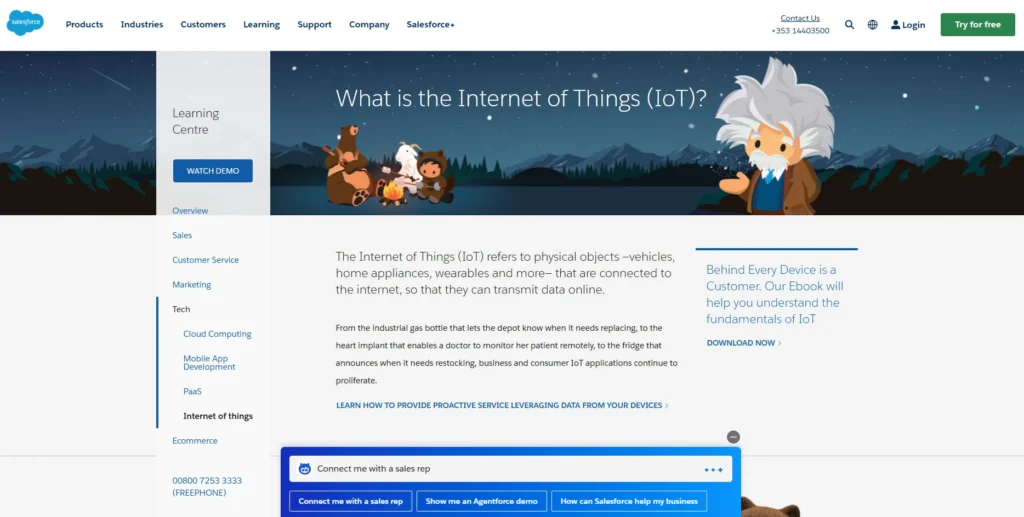
Salesforce IOT Cloud assists companies in transforming their data into personalized customer experience. It links device data available in real-time with the Salesforce CRM tool so that the company is able to act swiftly in terms of addressing customer demands. This is ideal as firms that engage customers such as retail and service providers.
The device activation invokes some actions by the platform, which is achieved through automation. Salesforce IoT cloud offers enterprises with simple dashboards and powerful data integration capabilities to better serve their customers, decrease downtimes, and enhance relationships with customers.
Features:
- Real-time data integration with Salesforce CRM
- Event-driven automation and workflows
- Drag-and-drop builder for rules and logic
- Customer-focused IoT experiences
- Scalable cloud infrastructure
- Great for service-oriented businesses
8. Oracle IoT
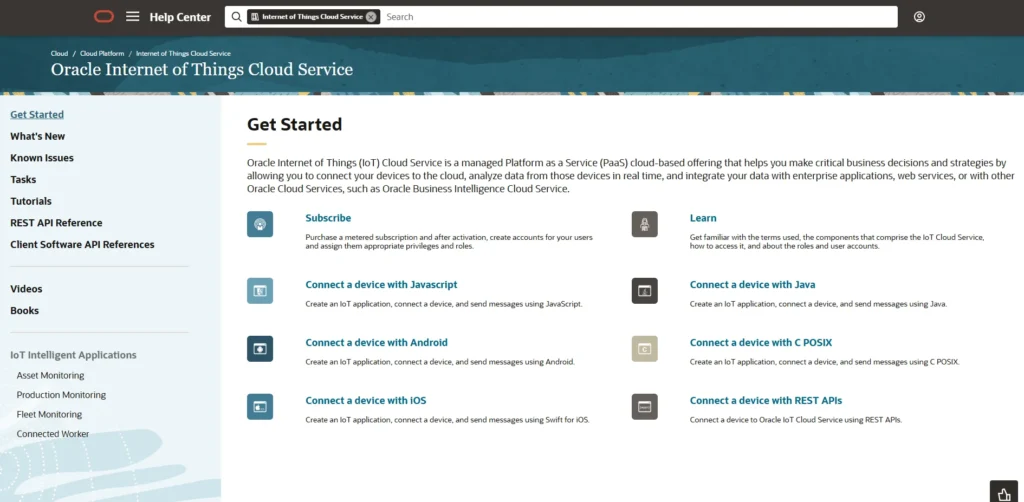
Oracle IoT Cloud enables companies to control devices, gather real-time information, and enhance their activities. It is simple to interface with other software provided by Oracle, such as Enterprise Resource Planning software and supply chain applications. The platform provides machine learning, analytics, and automated alerts, which assist companies in making quick decisions.
It is applied to such industries as production, transportation, and auto-industry. Oracle IoT is associated with high levels of security and scalability, which means introducing it to large enterprises allows them to enhance efficiency and minimize expenses with the help of connected devices.
Features:
- Seamless connection with Oracle ERP and SCM tools
- Real-time monitoring and diagnostics
- Machine learning and AI-powered insights
- Event management and automation
- Scalable and secure platform
- Industry-grade compliance
9. IRI Voracity
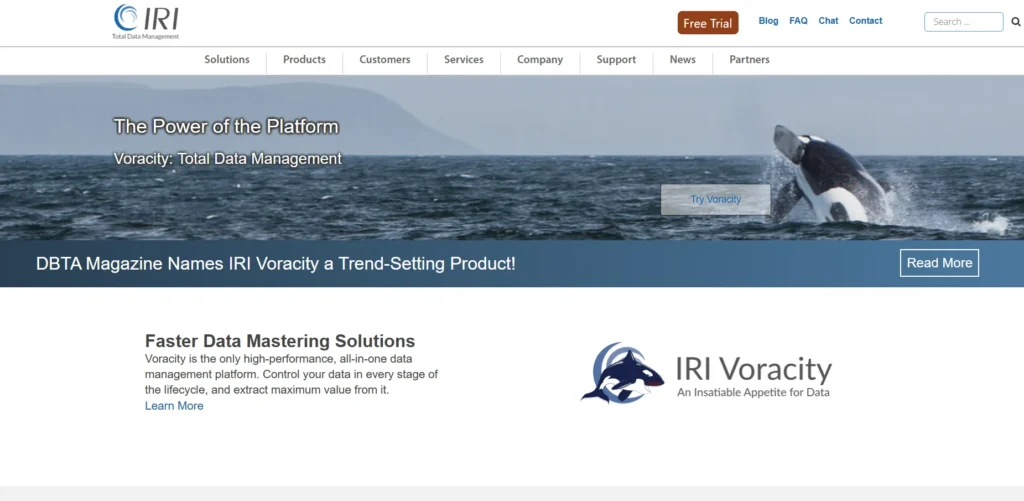
IRI Voracity is an information management platform that accommodates IoT cases as well. It assists business organizations to capture, process and analyze a huge pile of data through joined devices. It is particularly powerful when it comes to the ability to process complex data fast and safely.
Voracity promotes real-time computing, data combination, and data analysis. It is suitable for high-data volume industries such as energy, finance, and telecom. Because of its fluid design, companies have an opportunity to employ Voracity on both traditional and IoT data projects in a single platform, while also integrating it with project management tools for streamlined execution.
Features:
- High-performance data integration and ETL
- Real-time and batch data processing
- Secure and scalable data management
- Ideal for handling large IoT data volumes
- Data masking, encryption, and compliance support
- Unified platform for traditional and IoT analytics
10. Microsoft Azure IoT
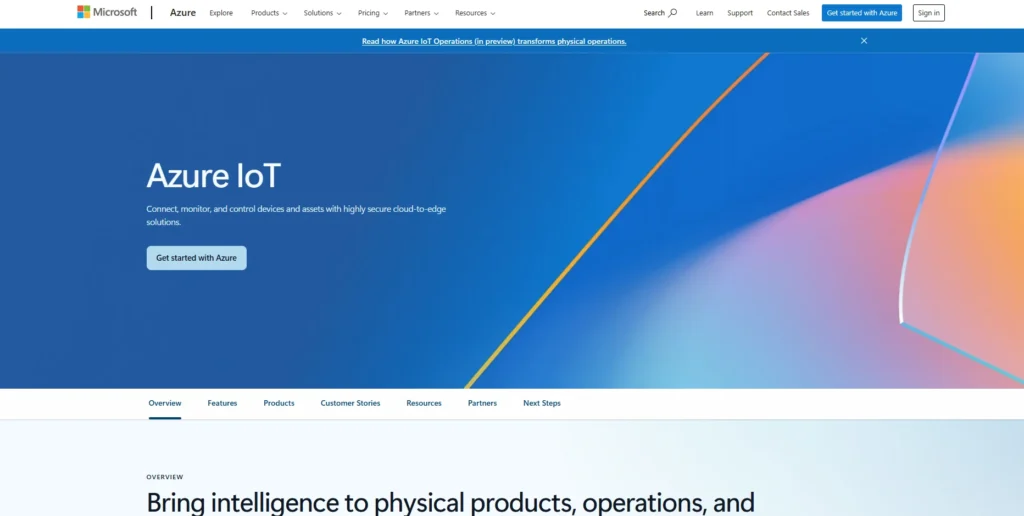
Microsoft Azure IoT is a versatile platform that aids connection, monitoring, and management of billions of devices. It features in-built analytic, machine learning, and real-time tracking. Azure IoT is freely combined with other Microsoft products, and is compatible with edge computing.
It is also common in production, smart buildings, the medical field and retail. Azure IoT covers most business needs and scales to meet the needs of the business worldwide with powerful and reliable foresight.
Features:
- Connects and manages billions of devices
- Real-time monitoring and control
- Azure AI and analytics integration
- Edge computing with Azure IoT Edge
- Secure device provisioning and updates
- Scalable cloud services for all industries
Ending Note
In a hyperconnected world, a good IoT platforms is a tool, but an IoT platform is a strategic asset as well. In agile device management and predictive analytics, real-time data analysis and end-to-end security builds, the proper platform can fuel innovation, lessen operations expenses, and provide smart experiences to the users.
There is no silver bullet, but it is vital to find a platform that fits your technical requirements and business objectives. All about focusing on edge computing, AI integration, or being cloud-friendly, your choice will define your IoT success. Technology is ever-changing, and being informed and flexible will keep your organization on top.
FAQs
1. Which industries take best advantage of IoT cloud services?
Manufacturing, healthcare, logistics, agriculture, and smart cities industries engage in IoT cloud services to automate, monitor, derive insights, and make better decisions throughout their operations.
2. Which features are important in an IoT cloud platform?
Seek scalability, ability to manage the devices, data security, real-time analytics, support of integration APIs and interactive dashboards to deploy and eventually succeed.
3. Are IoT cloud platforms compatible with other devices?
Yes, as platforms are built to leverage a wide array of protocols and device types, it is simpler to plug different types of sensors, machines, or gadgets together within a single system.
4. What are the cost-cutting benefits of IoT cloud services?
They remove the demand of heavy infra, automate processes, and deliver predictive maintenance information-assisting businesses to take less downtime, energy saving, and preventive inappropriate repairs.
5. Is there real-time monitoring in IoT cloud platforms?
Yes, they provide real-time data tracking and notifications, which makes them robust to respond to issues in time, improved working abilities, and more control over the connected devices.
